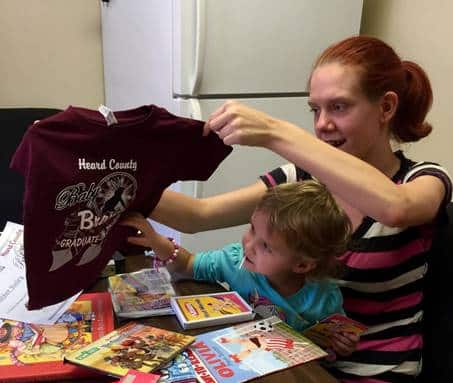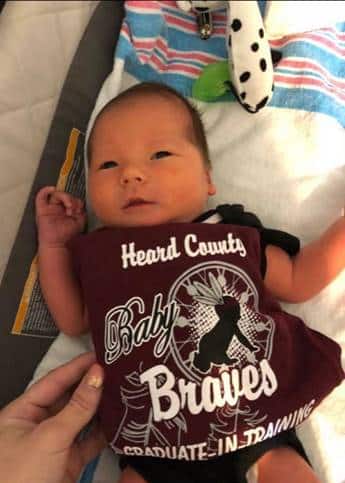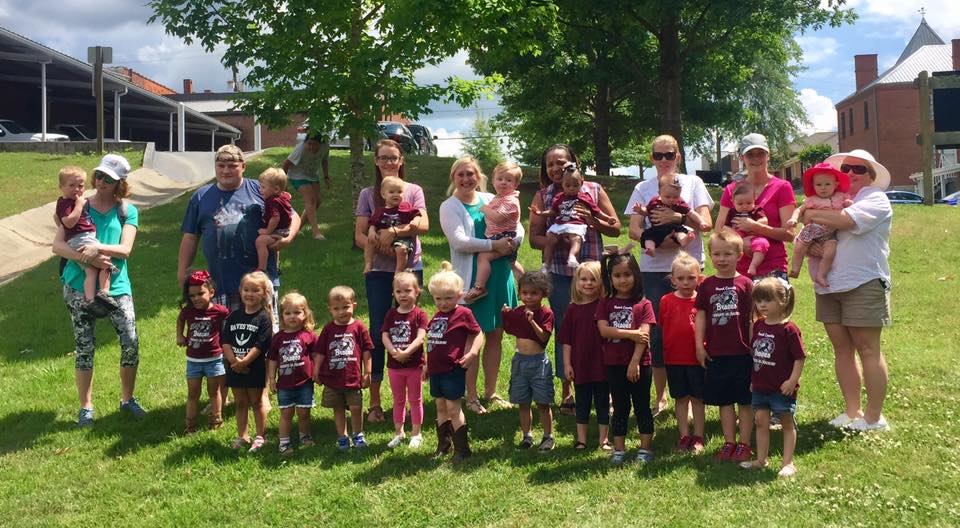Baby Braves Program Takes Babies from Cradle to Career

By Sarah Torian
The Heard County School System (HCSS) is welcoming the Class of 2037 this summer. These young learners born in the past year, called Baby Braves, are at the heart of efforts in the county to increase high school completion rates by preparing all children to enroll in college, embark on a career, or enlist in the service after graduation.
When former Heard County High School principal Rodney Kay was preparing to transition into the role of superintendent in 2016, he knew the school system had much to celebrate with more than 84 percent of local students graduating on time—five points above the state average. But he also knew more could be done to support students who were dropping out in a county where too many families are economically disadvantaged and lack access to books, transportation, and other families.
“Talking about how to increase graduation rates led us to look at third-grade reading as a predictor of graduation, and far too many of our kids didn’t meet that early milestone,” said Kay. “We’re fortunate to have a high level of trust from the community, and that is allowing us to resolve the issue by reaching out to parents and helping them prepare their children for success.”
Kay teamed up with Kathy Knowles, Heard County Community Partnership (HCCP) executive director, to increase access to books for babies and help parents support their children’s literacy skills. The Baby Braves program—named for the Heard County High School mascot—launched in 2016, thanks to funding from Kaiser Permanente, and 260 families have since enrolled with 90 graduates now attending pre-K or kindergarten.
“We don’t just hand materials to parents and walk away,” said Sheri Calhoun, the district’s director of federal programs and Baby Braves coordinator. “We teach them how to use the materials and explain how they can promote their baby’s early brain development as part of their daily routine.”
Specially trained school staff members visit enrolled families at home. They inform parents about their role as their child’s first and most important teacher and the impact of engaging with their baby. Children are presented with an honorary diploma with their anticipated high school graduation year and tote bag full of books, puzzles, and a Baby Braves shirt.

The school system maintains a connection with Baby Braves families by hosting quarterly class reunions. Families also participate in the district’s Parent University, where they can mingle with teachers and staff from the children’s future schools and visit information stations that address math and reading readiness, fine and gross motor skills, and social-emotional learning. Elementary school principals run the registration table while pre-K teachers invite families into their classrooms to build excitement about the first day of school. School board members and local leaders frequently attend these reunions, underscoring the community-wide commitment to early language and literacy, and special education teachers conduct informal assessments to help identify children who might need early intervention and support.
A grant from the Community Foundation of West Georgia to the University of West Georgia provided HCSS access to a speech-language pathologist and student interns to identify children who need early intervention, which research shows is critical to improving long-term outcomes. A partnership with the Marcus Autism Center helps identify and support children who might be on the autism spectrum. Program leaders capture data on family education and income levels, the depth of their engagement, and the children’s level of readiness as they enter pre-K and kindergarten. Plans are in place to measure the impact of these early supports on children’s success throughout school.
“We’re attempting to close the school readiness gap by finding and engaging children who are falling behind the children on track to succeed in school,” said Calhoun. “Many families are economically disadvantaged and, with only one child care center in the county, most young children are at home with parents or grandparents during the day.”
Reunion events are also leveraged to promote social connections among families, a need identified through follow-up parent surveys.
“Houses are spread out and people don’t always know each other,” said Calhoun. “Parents wanted a chance to meet other parents with young children where they live, so we began seating people at tables sorted by community. Now they schedule playdates between the class reunions.”

Beyond that, plans to increase access are in place in launch the Braves Bus next summer to deliver meals and books to families across the county who lack transportation.
“Our children often don’t have many books in their home and getting to the library can be difficult,” said Calhoun. “Those are the ones we will target with the Braves Bus. Special education case managers, teachers, and administrators will deliver short lessons to children and share information with parents.”
Meanwhile, local leaders are working to reinstate Head Start and Early Head Start programs to address the limited access to early learning programs in Heard County. The district will operate two classrooms for 3-year-olds in 2020, with plans for a couple more the following year.
“We used to be content to use a slogan like ‘Destination Graduation’—but now we know our work doesn’t stop at graduation,” said Kay. “We want all Heard County graduates to fit into one of the three E’s: enrollment, enlistment, or employment.”
A handful of school districts have already begun to replicate this approach—from the Growing Greyhounds in Jones County to the Baby Hornets in Cook County—and more are reaching out to learn how they can implement this simple yet innovative approach to promoting school readiness.
“We’re putting in the time and effort to make this program a success and holding ourselves accountable for the outcomes,” said Knowles. “That level of commitment from all partners will greatly benefit our children and their families and assure their future success. We want our students and families to know we’re all in this together—from cradle to career.”
